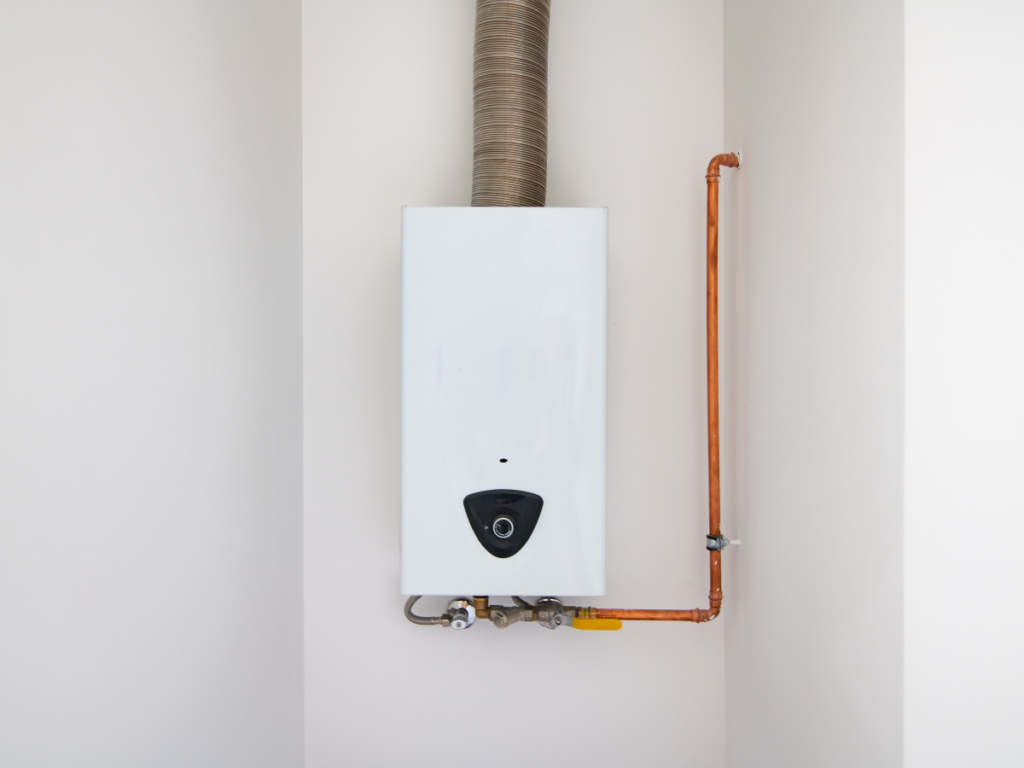In the quest for more energy-efficient and cost-effective solutions for our homes, many are turning their attention to tankless water heater installation. As homeowners seek ways to reduce their HVAC, electrical, and plumbing system issues, tankless water heaters emerge as a promising option. This ultimate guide to tankless water heaters will explore the workings, benefits, and considerations of making the switch from a traditional water heater to a tankless model, providing you with the knowledge to decide if it’s the right choice for your home.
Understanding How Tankless Water Heaters Work
Tankless water heaters, distinguished from their traditional counterparts by their ability to heat water on demand without the need for a storage tank, use a direct heating approach. When a hot water tap within the home is activated, cold water is channeled through a pipe and into the unit, where it is instantaneously heated by either a gas burner or an electric element. This process ensures that hot water is not just immediately available but is also continuously supplied, catering to the household’s needs without the pause or delay often experienced with tank systems waiting to replenish.
This method of heating water as it is needed, rather than maintaining a constant temperature in a large tank, sidesteps the energy losses associated with standby heat present in traditional systems. The key to this efficient operation lies in the water heater’s design, which activates the heating mechanism only in response to water flow, thereby providing hot water precisely when and for as long as it is required. This operational efficiency is fundamental to understanding why tankless water heaters are celebrated for their role in reducing energy consumption and optimizing the household’s utility of hot water.
The Efficiency Edge of Going Tankless
Tankless water heaters are great for energy conservation because they operate only when there is a demand for hot water. This on-demand or instantaneous heating eliminates the standby energy losses associated with traditional tank storage heaters, which must continually heat and reheat water to maintain a set temperature.
The unique operational model of tankless units means they can achieve remarkable levels of efficiency. For households that consume 41 gallons or less of hot water daily, tankless water heaters can be 24% to 34% more energy efficient than their traditional counterparts. Even in homes with higher hot water usage, the efficiency improvements offered by tankless models range from 8% to 14%. These savings are not just theoretical; they translate into tangible reductions in monthly energy bills.
By directly heating water as it flows to the tap, tankless systems ensure that no energy is wasted heating water that isn’t immediately needed. This method of operation not only aligns with the growing trend towards energy conservation but also positions tankless water heaters as a sustainable option for forward-thinking homeowners. The shift towards tankless technology is driven by both its immediate benefits in terms of energy savings and its contribution to a broader effort to reduce household energy consumption and the associated environmental impact.
Long-Term Cost Savings and Environmental Impact
The up-front investment in a tankless water heater often surpasses that of its traditional counterpart, but the true value of this technology becomes evident in the ensuring years. These innovative units boast a notably longer life expectancy, extending beyond 20 years with proper maintenance, in stark contrast to the 10- to 15-year lifespan of conventional tank models. This durability translates into fewer replacements and, consequently, less material waste over time.
Financially, the operational savings of tankless water heaters are a significant advantage. The heightened efficiency with which they operate—directly heating water on demand—means that households can expect a reduction in monthly energy expenditures. This is not a mere incremental decrease; the savings accumulate over the lifespan of the unit, making the initial higher cost a worthwhile investment for many.
From an ecological standpoint, the reduced energy consumption of tankless water heaters aligns with broader environmental goals. By diminishing the demand on energy resources, these units contribute to a decrease in the carbon footprint associated with heating water. The implications of this efficiency are twofold: homeowners benefit from lower energy costs while participating in a global effort towards more sustainable energy usage. This dual advantage amplifies the appeal of tankless water heaters, positioning them as not only economically sensible but also environmentally responsible choices for modern living.
Comparing Tankless to Traditional Water Heaters
When delving into the differences between tankless and traditional water heaters, several pivotal aspects stand out. One of the primary distinctions lies in the capacity to supply hot water. Tankless models, known for their on-demand heating capabilities, can offer a continuous flow of hot water, making them ideal for households with variable and high usage periods. However, their performance is contingent upon the flow rate, which may limit the volume of hot water available at any given moment. This can pose a challenge in homes with simultaneous demands for hot water across multiple outlets.
Conversely, traditional tank water heaters maintain a reservoir of heated water ready for use. This can provide an immediate supply to multiple points of use, albeit with a finite limit based on the tank’s capacity. Once depleted, users must wait for the tank to refill and reheat, potentially causing interruptions in hot water availability during times of heavy usage.
Another consideration is the physical footprint of each system. Tankless units boast a compact design, freeing up valuable space within the home. This is in stark contrast to traditional models, which require substantial space for the tank, often dictating their placement to basements or utility rooms.
Both systems present unique benefits and limitations, underscoring the importance of evaluating household water usage patterns, space availability, and preferences in hot water access. This comparison highlights the need for careful consideration when choosing between tankless and traditional water heaters, ensuring the selected system aligns with specific household requirements and expectations. Get in touch with the plumbing professionals at Best Home Services for expert guidance and advice.
The Importance of Professional Installation and Maintenance
Navigating the installation of a tankless water heater goes beyond the realms of a typical home improvement project. It demands an intricate understanding of both plumbing and, depending on the unit, electrical or gas systems. This complexity underscores the necessity of enlisting a professional plumber from Best Home Services who not only ensures that the installation adheres to local building codes but also optimizes the unit for peak performance.
A tankless water heater’s efficiency and longevity are significantly influenced by the quality of its installation and the commitment to routine maintenance. Professional maintenance plays a critical role in the unit’s operation, with tasks such as descaling vital for preventing the build-up of minerals that can impede performance. Additionally, a professional can conduct thorough inspections for gas or water leaks, which are essential for both the safety and efficiency of the unit.
Given the nuanced requirements of installing and maintaining these advanced heating systems, the expertise of a certified professional cannot be overstated. Their proficiency not only facilitates a seamless installation process but also ensures the system operates at its best, safeguarding the homeowner’s investment. This level of professional intervention is indispensable for maximizing the benefits of a tankless water heater, from extending its service life to ensuring it delivers on its promise of efficiency and reliability. Engaging with the plumbing professionals at Best Home Services for both installation and ongoing maintenance is a sound approach to harnessing the full potential of tankless water heating technology.
Making the Switch: Is a Tankless Water Heater Right for You?
Transitioning to a tankless water heater is a decision influenced by several factors unique to each household. The primary considerations include evaluating the typical hot water usage within the home, scrutinizing current energy expenses, and weighing the upfront cost against the long-term savings and benefits. Tankless water heaters, renowned for their efficiency and the convenience of providing hot water on demand, are particularly suited for homes experiencing high usage or for those individuals conscientious about reducing their environmental footprint and energy consumption.
It is crucial to acknowledge that the initial investment for a tankless system is generally higher than for traditional water heaters. However, the potential for energy savings and the extended lifespan of tankless models can offset this initial cost over time. Additionally, the compact size of tankless heaters frees up space, offering flexibility in home layout and utility space management.
Before making a commitment, engaging with a plumbing professional is advisable. A knowledgeable expert can assess your home’s specific needs, advising on the optimal size and type of tankless water heater that would best serve your household. This step ensures that the chosen system not only fits your home’s infrastructure but also delivers the anticipated efficiency and cost-effectiveness.
Ultimately, the decision to switch hinges on a careful analysis of your home’s requirements, future savings, and personal priorities concerning energy use and environmental impact. With professional guidance, selecting a tankless water heater can be a sound investment, contributing to both the comfort and sustainability of your home.

